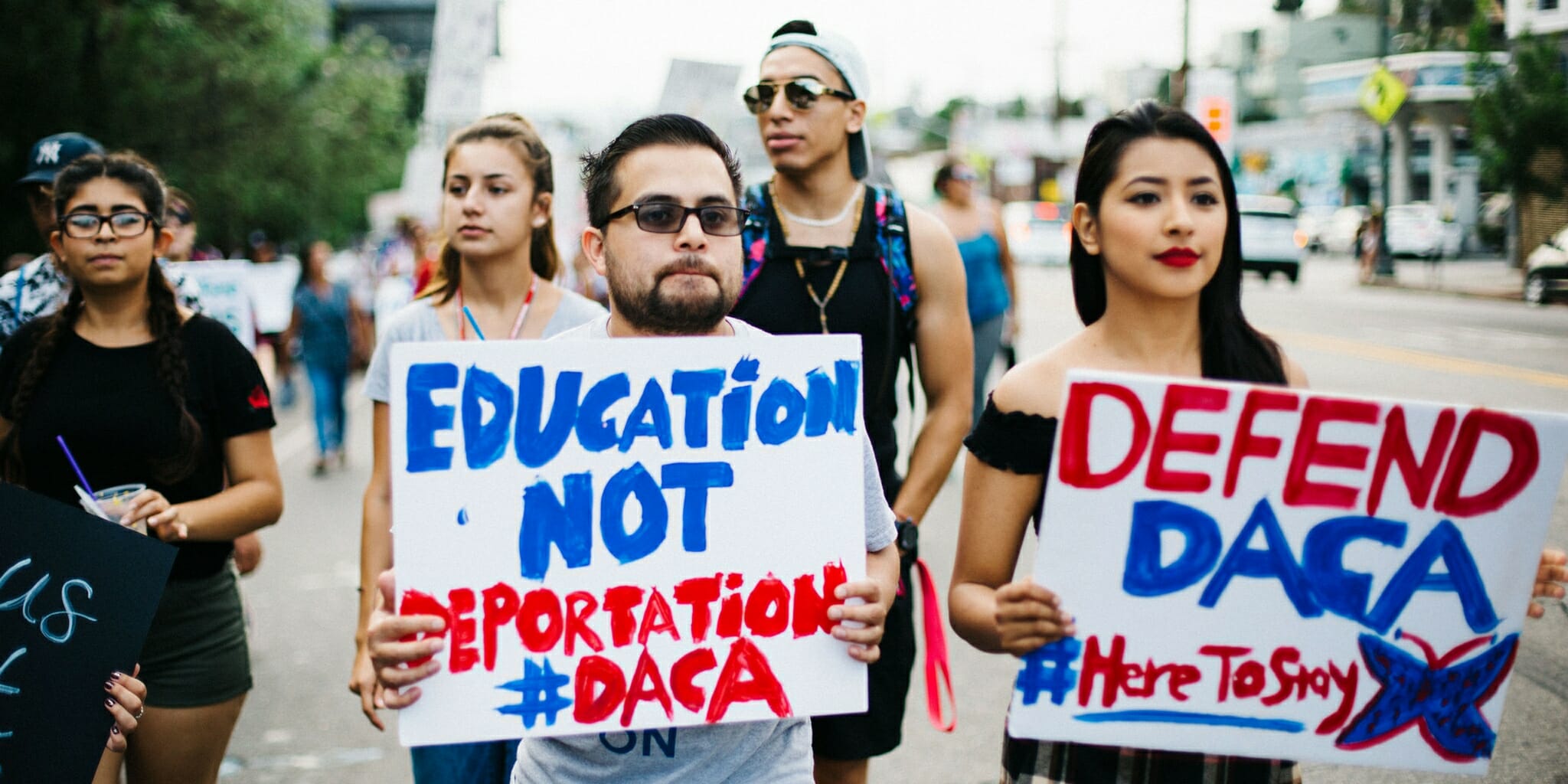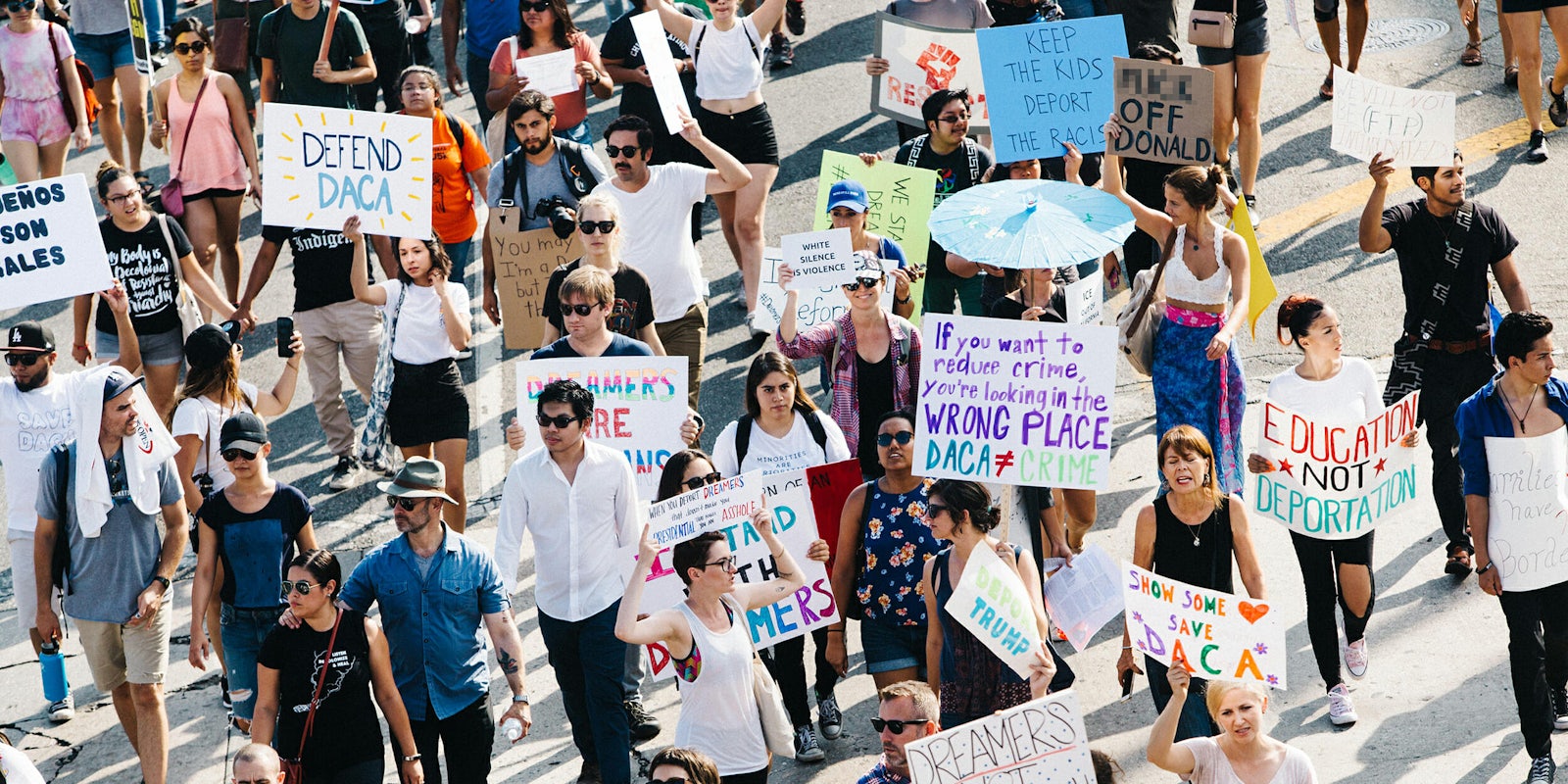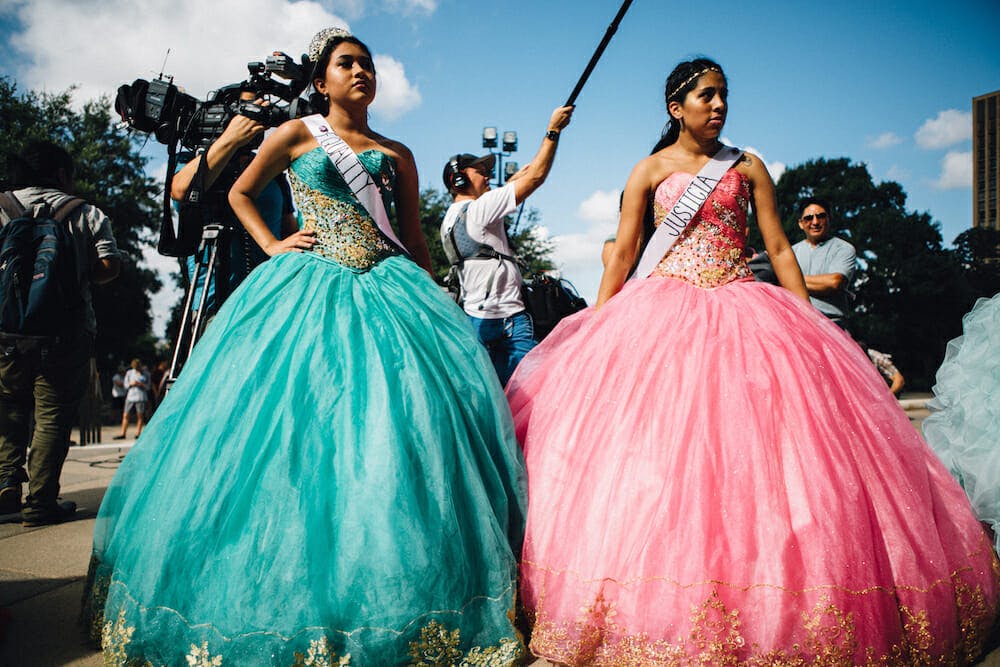In September, the Trump administration announced the rollback of the Deferred Action for Childhood Arrivals (DACA) program, an Obama-administration executive order that allows hundreds of thousands of undocumented young people to work legally in the United States. Since then, an estimated 17,381 people have lost their DACA status, with Congress and President Donald Trump scrambling, and failing, to pass a “clean” Dream Act that would give DACA recipients, known as Dreamers, a path to citizenship without any “compromises” that would endanger their futures or their families.
On Wednesday, the White House announced it would be releasing a framework for proposed immigration reform on Monday, only to share that information Thursday night. In the framework, Trump wants to create a 10-12-year-long path to citizenship for 1.8 million undocumented immigrants but has asked for several concessions, including a $25 billion border wall trust, the end of the diversity visa program, and the shrinking of family-sponsored immigration. So why doesn’t this work for DACA recipients?
In a conversation with the Daily Dot, nationally renown activist Cristina Tzintzún explains why Trump’s proposal isn’t a gift for DACA recipients to accept with open arms. At age 24, Tzintzún co-founded the Workers Defense Project and has since helped pass half a dozen local and state laws for workers’ rights. She is now the founder and executive director of Jolt, which aims to mobilize and unite Texas’ Latino community. Last year, Jolt led the much-applauded anti-SB4 sanctuary city bill protest that featured young Latinas in Quinceañera dresses at the Texas Capitol Building.
What has been your initial reaction to the immigration proposal that the Trump administration sent out on Thursday?
Cristina Tzintzún: This bill is an attempt to keep people of color from becoming an even more significant portion of this population, because [the Trump administration] knows that communities of color are not aligned with their agenda, that they will vote them out of power.
The same administration that called white people marching in the streets of Charlottesville with swastikas and torches “good” is now proposing a bill that would break up immigrant families and communities color, target them, and build a wall in between two countries that have a long partnership and relationship. So this bill is not a starting point. It is not a gift. It is not a negotiation. It is a wish list of a white supremacist to keep communities of color from being able to integrate and be part of the country that they call home.

I think what we need to remember is that [Trump’s proposed] pathway to citizenship takes a decade, but these people have already lived here for at least a decade, many of them, so that’s 20 years for a pathway to citizenship. The same people that purport to support family values are refusing and denying the rights of immigrant families to live together, to take care of one another, and that that goes in direct opposition of what our immigration policies have been based on. They have been based on our core values as a country that protects and celebrates families, and this administration wants to not only not allow families to reunite and be together, they also want to put millions of more dollars into deporting and breaking up families.
My husband, for example, is a Dreamer. He just got his legal permanent resident status several months ago. Under this bill, our son’s grandmother could never apply to become a citizen, or even apply to become a legal permanent resident. So at any moment, our son’s grandmother, who takes care of him every single day while we go out and work, could be deported.
In terms of Trump’s latest proposal and the back-and-forth in Congress that’s been happening over the past several weeks, do you think there is a chance for a clean Dream Act? Is that all an option we might have?
You know, I think we need to not take anybody’s words for granted at this point. We need to organize with the idea that really it’s up to us to win the Dream Act, and that that is the mentality we have at Jolt—that it is up to our community to organize, mobilize, vote, and fight, and for those of us who can vote to vote and fight back for our communities. We shouldn’t rest easy until we’ve won a clean Dream Act, so we should have hope that we can win.
In terms of the specificities of a clean Dream Act, I’m having arguments with people who say we need to close the borders first. What would you say to those who don’t understand the necessity of a clean act, and don’t understand why it is that Dreamers don’t want any of Trump’s demands attached to something that would give them a path to legalization?
To me, young people’s dreams, hopes, and futures should not be negotiated with. It should not be bargained with. Thinking about how this country has been deeply founded—on immigration; on those principles of equality, democracy, of representation—these young Dreamers deserve that as much as anybody else that came before them. And so for us, negotiating their dreams and hopes and futures on components that would further criminalize other parts of their community—their mothers, their fathers, their aunts, their uncles, their cousins—it’s not something that we can or should do.
And on top of that, there’s a lot of talk right now about the term “chain migration,” which is family migration. These immigrant families deserve to be together. Families help contribute to people’s success through love and protection, and… what Dreamers are doing is calling that out and saying, “We refused to bargain and negotiate the rights of our family and parents for an exchange for ourselves.”
As someone who has been involved for more than a decade in the activism for Latino communities, what have been the stark differences that you’ve noticed over the years? Is there anything that surprised you?
You know, when the first massive immigrants’ rights marches happened in 2006, I was 24 years old at the time, and I thought, “Wow, we put millions of people into the streets, we created the largest marches and demonstrations, we got thousands of people to not go to work, the largest massive strikes to ever happen this country.” And I thought, “Surely tomorrow, immigration reform will happen.” But it didn’t, and I think that it didn’t in part because as immigrants’ rights activists we failed to really harness the power of the electorate of communities of color, and really build bridges with communities of color, and Democrats consistently turned their back on our communities because of that.
They felt that there was no consequence for refusing to stand with us, and that the other side was worse, and thus they didn’t have to give us anything. I think Democrats are now realizing that do have to give our community something for us to turn out for the power of our vote, so I see that as a change.
But I think we will win the full rights of equality for our community when we expand the immigrants’ rights fight into a racial justice one. Because to me, the attacks on laws like SB4 [which requires local Texas law enforcement to work with immigration authorities], or even attacks on DACA, are really attacks on broader communities of color because they don’t want our communities to have the power to transform who’s in office and what issues will get addressed by our elected leaders.
You bring up a really strong point when it comes to race. I find that within my own family—my mother’s Filipino and she was able to get citizenship after she married my father, who’s an American-born white man from West Texas…
You’re a halfie, like me! Well, not Latino, but still.
Yeah, what a world being a halfie is!
Yeah.
In my mind, it makes sense to think, “OK, you’re an immigrant, you might be able to have more sympathy [toward undocumented people],” but I think that there is still an inkling of this “good immigrant vs. bad immigrant” mentality. Like, “I did it the ‘right’ way. They should be able to do it the ‘right’ way.” Within uniting the Latino community, are there similar sentiments, and if so, how do you change people’s minds?
If you look at a law like SB4 in Texas, that law really opened the door to racial profiling and anyone who was considered “foreign.” Even though people of color already make up a majority of Texas—and ignoring the tradition of how Texas was once part of Mexico and the communities have been there for centuries—there was still an idea that if you weren’t white, you would be considered foreign and this law was targeting you. However, the language that Republicans used was that it was “just” an attack on the undocumented. But we have to expose the targeting of the undocumented as the red herring it is.
It is a target on communities of color because the majority of the undocumented are immigrants of color from Latin America, and the same people that said they wanted to stop “just” undocumented immigration, now say they want to stop legal immigration. The same people that said they wanted to stop just undocumented immigration because people were breaking the rules supposedly, now say that places like Haiti and Africa are “shitholes,” and that they would prefer people from Norway—which means “white.”
The criminalizing of immigrants has really been nothing but taking away the power and voice of communities of color, because they know that this country and its demographics are shifting. What good white progressive allies need to know is, as those shifts happen, that communities of color will organize and represent the needs of the entirety of what this country looks like. As we gain power and voice, bigotry will continue to have less and less of a place in this country. So bigots and racists should be fearful.
And that is what we see happening: Bigots and racists like we see in the Trump administration, whether it had been with Steve Bannon or Steve Miller, they want to roll back the gains and the changing demographics of this country. And if we stand together as communities of color, with good white progressive allies, we have the power to not just take them out of office, but transform how this country operates and who it benefits.



